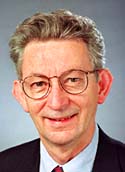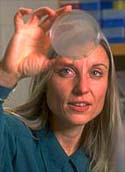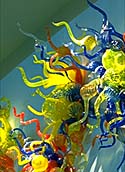
Chancellor David Ward set up a new technology council. |
Updating The Wisconsin Idea
Chancellor David Ward in September
set up a new council to recommend ways
the university can help researchers take their discoveries into commercial venues. The top priority of the chancellor's Technology Transfer Council is to avoid conflicts of interest between the university's academic mission and business interests. Council members include leaders from University Research Park, University-Industry Relations, the Wisconsin Alumni Research Foundation, and faculty and staff.
In April, the School of Business held
a groundbreaking ceremony for the Fluno Center for Executive Education, an eight-story, state-of-the-art learning center to be built in the 600 block of University Avenue. The center, slated to open in early 2000, will include classrooms, an amphitheater, dining facilities and 100 residence rooms - allowing total immersion in the educational experience for those attending courses there. The $22.5 million construction is being funded by private gifts and bonds.

$1.5 million in funding will boost the biological sciences. |
Maintaining research preeminence
Eight faculty positions will be added in
the biological sciences with a $1.5 million funding boost from the state. Recommended by Gov. Tommy Thompson in April, the expansion in these teaching and research areas will help UW capitalize on its national strengths in fields such as biotechnology and genetics. The Legislature approved the additional funding in May, and the governor signed the measure into law in June as part
of his budget adjustment bill.
To help UW-Madison succeed in the heated competition for the nation's brightest graduate students, the Graduate School has initiated a campaign to build a $200 million endowment for the support of as many as 400 graduate fellows. The Wisconsin Distinguished Graduate Fellowship Program, among the largest of its kind, will award selected master's and doctoral students up to $24,000 annually. Support comes from a partnership among the Graduate School, the Wisconsin Alumni Research Foundation, the UW Foundation, and UW-Madison's schools and colleges.
A team of UW-Madison researchers published a study in April demonstrating how new forms of collagen, a protein that acts as a solder in the body, may help treat arthritis and repair damaged organs. The team's work is showing the way to creating a strong form of collagen that is less susceptible to breakdown. Since collagen helps form strong fibers and connective tissue between bones, the protein's breakdown is at the heart of debilitating diseases such as arthritis, brittle bones and cataracts. A stronger source of collagen
could help heal wounds without scars and strengthen frail bones.
Rethinking our organization
To pioneer studies linking scholarly pursuits across different academic areas, funds were reallocated to create 12 faculty positions in five research areas. Part of Chancellor David Ward's strategic hiring initiative, the slots will cover genetics, biology, materials research and a new international public affairs master's program. The areas were chosen from 95 proposals submitted by UW-Madison faculty.

Business students are managing $10 million in UW System funds. |
Focusing on students
UW business school students are now managing $10 million of the UW System's Intermediate Fixed-Income Fund. Students managed the fund as a test for a year before gaining the UW System Board of Regents' approval to do so full time. A team of students in the Applied Security Analysis Program oversees the funds every day the market is open. A professor and an advisory board of alumni professional investors supervise the student managers.
The first-ever waiver of in-state tuition for teaching and program assistants took effect
in January, allowing the UW to compete with other universities to attract top graduate students. The agreement - which frees many TAs and PAs from paying tuition, as is the case at many graduate schools - was reached by the university and the Legislature as part of the Teaching Assistants Association's two-year contract for graduate employees. Research assistants receive the waiver this fall.
Baby-sitting while studying is more than just a part-time job for the residents of UW's first campus home for single-parent students. Three students and their children moved in August into the Nancy Denney House, named for the late UW psychology professor who spearheaded the idea of creating a cooperative residence to help single parents complete
their education.
Bucky Badger will take to the ice for a new UW team following a decision to add
ice hockey as the next women's intercollegiate varsity team. A thriving club sport since 1972, ice hockey will become the 12th women's sport at UW-Madison. Competition will begin during the 1999-2000 academic year. Thirteen NCAA schools, such as the University of Minnesota and St. Cloud State, now compete in the sport at the Division I level; other schools, such as Ohio State, will add it during the next two years.
Encouraging collaboration
In June, Chancellor David Ward hosted the second annual University and Community Partnerships reception to commend individuals from the Madison area and the UW-Madison community who have developed educational, community-service, scientific, business and civic partnerships. These collaborations are helping to promote community development and economic growth, and to improve access to educational resources.

The 14th Dalai Lama of Tibet received an honorary degree. |
Joining the global community
In May, Nobel laureate Tenzin Gyatso, the 14th Dalai Lama of Tibet, made his third
visit to the UW-Madison campus, where
he received an honorary degree at commencement. More than 10,000 students and area residents attended his public talk at the Kohl Center. UW-Madison is considered
a world center for the scholarly study of Tibetan Buddhism.
Using technology wisely
Applying to graduate school has become
easier for the approximately 12,000 prospective students who apply each year
to one of UW-Madison's 125 graduate programs. As of September 1997, applications can be completed on-line via the Internet, thereby providing easy access and saving time and money for both the applicants and
the university.

A colorful glass sculpture graces the new Kohl Center's lobby. |
Renewing the physical campus
With much fanfare and a resounding victory by the UW men's basketball team over Northwestern, the Kohl Center debuted January 17 to a capacity crowd. The state-of-the-art arena features two decks and accommodates 16,500 people. A 120-foot blown-glass sculpture created by UW alum Dale Chihuly enhances the main entrance. Thousands of guests toured the $76.4 million center January 18 as the UW Band tested the acoustics. This fall, the men's ice hockey team will play its first season in the arena.
The UW Field House sent its last batch
of graduates out into the world in December as about 2,500 mid-year graduates bade farewell to "the Barn" as the university's commencement site. The Field House had hosted every UW winter commencement since it opened its doors in 1931 and every spring commencement since 1991. This spring, graduates broke in the new Kohl Center as
the official commencement site.





